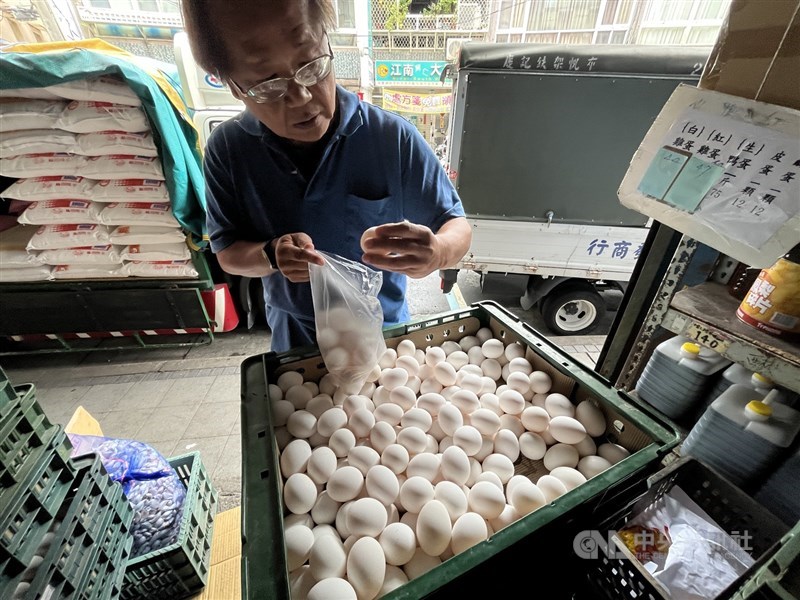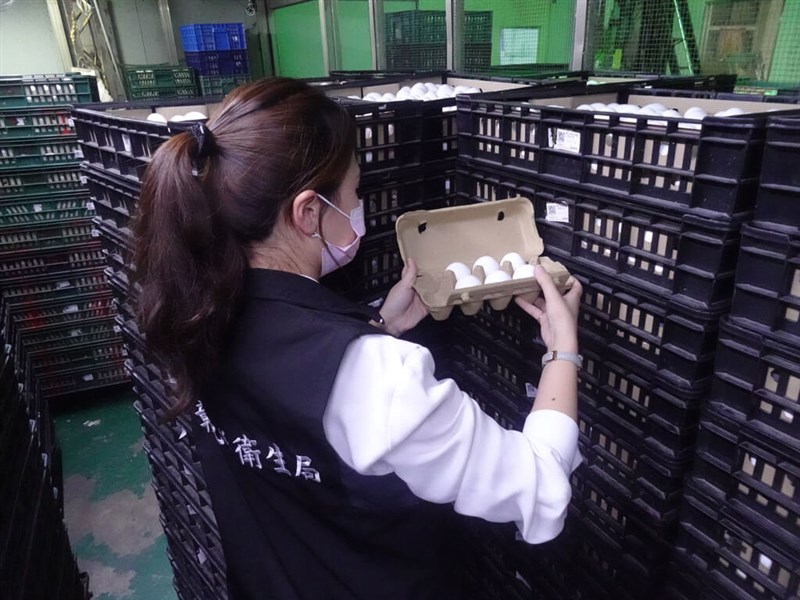
Taipei, Nov. 10 (CNA) More than 150,000 eggs potentially contaminated with high residues of the pesticide fipronil-sulfone have entered the market in 10 municipalities throughout Taiwan, the country's Food and Drug Administration (TFDA) said Sunday night.
An emergency recall of the eggs has been issued in the 10 areas, the TFDA said, naming Taoyuan, Taichung, Tainan, Kaohsiung, Chiayi city, and Hsinchu, Changhua, Yunlin, Nantou, and Chiayi counties.
The recall order was issued following a finding by Changhua's Public Health Bureau on Nov. 4 of 0.03 parts per million (ppm) of fipronil-sulfone in a batch of eggs from a local farm, which was in excess of the permissible level of 0.01 ppm, according to the TFDA.
The 626 cartons of eggs were immediately traced and recalled, but 543 cartons had already been sold to consumers, TFDA Central Center Director-General Lin Hsu-yang (林旭陽) told the press Sunday night.
Changhua County carried out subsequent testing on the farm on Nov. 5 and 6, and contamination was found again in the eggs, prompting the Changhua agency to notify the other nine municipalities, where around 150,000 eggs with the same lot number had already entered the market, Lin said.

The TFDA urged consumers not to buy or eat eggs with the traceability code "I47045," and to return them to the retail stores or discard them if they have already been purchased.
While excessive levels of fipronil-sulfone may not directly affect human health, high doses could pose potential health risks, according to Lin.
He said the TFDA will provide information to agricultural agencies to investigate the cause of the contamination.
The TFDA will also keep working with local health agencies to test eggs on the market to ensure food safety, Lin said.
Health Minister Shih Chung-liang (石崇良) told the press Monday that initial investigations suggest the contamination resulted from environmental pollution, rather than from tainted feed or the use of pesticides on the farm.
Yang Chen-chang (楊振昌), director of occupational medicine and clinical toxicology at Taipei Veterans General Hospital, said that ingesting large amounts of the pesticide could cause symptoms such as cramps, headaches, dizziness, stomach pain, and nausea.
While acute poisoning is rare, accumulation over a long period of time may pose more serious health risks such as damage to the liver, kidneys, or thyroid gland, he said, citing studies conducted on animals.
Taiwan's standards for fipronil-sulfone residues are stricter than in Japan, South Korea, and the United States, according to Yang.
In a press release Sunday, the Changhua County Public Health Bureau said the fipronil-sulfone contamination was the first food safety case in Taiwan that was handled using traceability codes.
The traceability code system allows for the precise recall of faulty products and provides information to consumers and downstream businesses about a product's quality, the agency said.
Changhua's Department of Agriculture urged consumers to purchase eggs produced by the county's "Fresh Select" suppliers, which do not include the problematic egg farm.
Meanwhile, Hsinchu County's Public Health Bureau and the Taichung City government both said Sunday that they have issued recall orders for the contaminated eggs.
Also on Sunday, Kaohsiung's Department of Health said a local supermarket will be fined for failing to comply with an order to notify its customers of the egg problem.
The supermarket is subject to a fine of NT$60,000 (US$1,935) to NT$200 million, the health department said, citing the Act Governing Food Safety and Sanitation.
-
Business
Taiwan's consumer confidence weakens slightly in February
03/03/2026 11:07 AM -
Business
U.S. dollar higher in Taipei trading
03/03/2026 10:42 AM -
Culture
Mandopop singer Sun Yanzi to perform at Taipei Dome in May
03/03/2026 10:22 AM -
Society
Heavy rain advisory in effect for Nantou County
03/03/2026 10:16 AM -
Society
Taiwan headline news
03/03/2026 09:57 AM